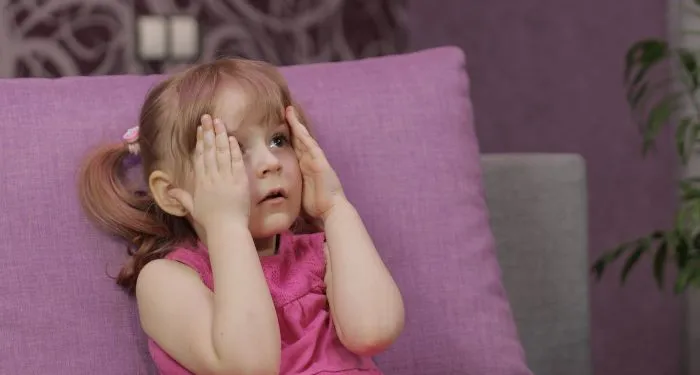
Why Reading Rainbow Gave Me Recurring Nightmares as a Child (But I Still Love LeVar Burton Anyway)
Like many an ‘80s kid, I pledged undying fealty to Reading Rainbow. The titles featured on the educational PBS show were the ones I sought in the library and begged for as gifts. Except for one book. One book gave me recurring nightmares for decades.
For years, I had scant memories of the nightmarish story featured in one particular Reading Rainbow episode. A farmer, working his field. An enormous volcano, out of absolutely nowhere. Utter destruction. Those details were all it took to push my little unconscious brain to the brink.
Look, I was a fearful kid. An incomplete list of things I was afraid of: ants, dogs, fire, fireworks, killer bees, cobwebs, alien abduction, the tiny people I thought lived in the desk in my bedroom, my grandparents’ unnervingly blue upstairs bathroom, and quicksand (a common fear among us ‘80s kids). Several of those made their way into my dreamscapes, but lava dominated them all. Raining from the sky, burbling out of the garden in my backyard, chasing me off the playground. Over and over, inescapable and terrifying.
Finding the Source
Several years ago, I realized good ol’ Wikipedia could fill in my memory gap. All it took was the list of episodes to identify the book haunting my childhood as Hill of Fire. It’s based on a true story. In 1943, the volcano now known as Parícutin burst suddenly from the earth in Mexican farmer Dionisio Pulido’s cornfield. Three people died, two towns were evacuated before being covered in lava, and three other towns were severely affected by the volcano’s eruption. If you’re ever traveling through Michoacán, you can even visit the lava-submerged ruins of the San Juan Parangaricutiro Church.
Shortly after identifying the book, I was among the DVDs in the children’s section of my public library, probably looking for a Garfield Halloween special or some other forgotten classic, when I happened upon a row of Reading Rainbow DVDs that included episodes from the 1980s.
Facing My Fears
I was ready this time. For the lava, the destruction. I checked out the DVD, walked home, and fired it up. As it does for most anyone of my generation, the theme song alone takes me back to a simpler, if hilariously fearful, time. Following that iconic song, the episode leads with lava. LeVar Burton is on location at Hawaii’s Kilauea, which is spewing molten volcanic effluvia high into the sky behind him. There’s something truly exhilarating and terrifying about this sight. He explains how hot it is, and shows footage of how quickly the lava flows. That speed scared me more than anything — in addition to being a frightened kid, I was a slow one.
The story Hill of Fire followed. It was just as I remembered. A farmer minding his business in the field nearly loses his ox to a smoking hole in the ground that then erupts into El Monstruo. While people were able to escape and found a new village, the volcano decimated their homes. As a child I took no solace from the ending, in which everyone was happy to be alive and have a new tourism industry in their new town, thanks to looky-loos eager to see the world’s newest volcano.
Following the story, LeVar explains more about volcanic activity. He introduces the layers of the earth, magma chambers, etc. He says there are hundreds of volcanoes scattered all over the world. What he never says? That volcanoes are very unlikely to erupt in your backyard or playground! He never says where on the globe volcanic activity is concentrated. No one told me that I lived on very volcanically inactive terrain. I thought that what happened to the nameless farmer in Hill of Fire could easily happen to me. Cue the nightmares. Isabelle, you might ask, why didn’t you simply tell your parents about your fears? Surely they would have assuaged them. Dear reader, that’s for me and my therapist to sort out!
When Will the Nightmare End?
Weirdly, it’s been years since I had a volcano nightmare. I obviously can’t say they’ve stopped for good; I’ve got many years left to live. But perhaps living in the Midwest means the more realistic tornado nightmares have gradually overtaken the volcano variety. It’s vaguely comforting to live in a place that has not had volcanic activity in human memory.
Or maybe it was seeing the episode again, noting that my juvenile fears were in some ways righteous. Another healing moment may have been visiting Volcanoes National Park myself — the very place LeVar Burton began the infamous episode — and staring into a glowing caldera. I marveled at this strange orange smolder, amazed that light really can come from inside the earth. Of all my theories, I prefer to think this is when I made peace with volcanoes. When I finally looked into the void, and it shone back at me.
Even though LeVar Burton didn’t anticipate my particular fear and head it off in that episode, I hold absolutely no ill will. If anything, rewatching the episode gave me renewed love for what Reading Rainbow did. (Burton’s bookish life continues to be aspirational, by the way.) That same episode had a fascinating segment with a potter practicing raku techniques from his studio near Kilauea. It also had the trademark, indelibly charming book recommendations from fellow ‘80s kids. The show did not condescend to its audience. It’s certainly played a huge role in making me the reader and the genuinely curious person I am today. Ultimately, the nightmares were a small price to pay.










